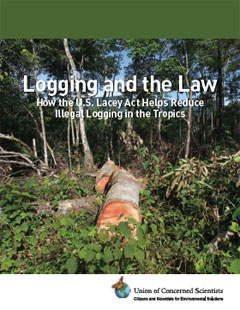Illegal logging and the associated trade of illegally sourced wood products is a clandestine industry that threatens forests and economies alike. It involves cutting trees without permits or removing trees from protected areas, and other activities such as avoiding taxes and laundering illegal logs.
While illegal logging occurs in many parts of the world, much of it is concentrated in the tropics, where prized hardwoods are taken to make items like furniture, cabinets, and other architectural woodwork.
In 2008 Congress passed amendments to the Lacey Act, a century-old law that combats trafficking in illegal plants and wildlife, and thus closed the entire U.S. market to illegally sourced wood.
If effectively implemented, the Lacey Act will:
- Reduce illegal logging and its costly impacts.
- Help ensure that businesses know where their wood is coming from.
- Protect the legal forestry industry in the United States.
- Provide economic development opportunities.
- Help promote sustainable management of tropical forests.




